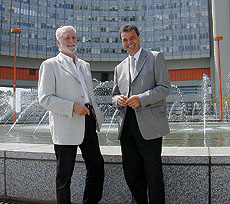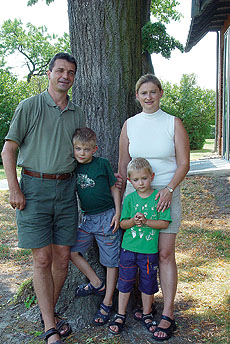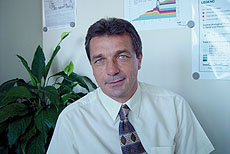 |
| The former and the current Executive Secretary take time off work to seize a photo opportunity |
Through a selection process involving all ICPDR member countries, Philip Weller has been chosen to succeed Joachim Bendow, who will retire in autumn this year. Danube Watch met with Mr. Weller and asked him about his view of the Danube Basin, the ICPDR and its future challenges.
DANUBE WATCH: Mr. Weller, congratulations for your position as the new Executive Secretary of the ICPDR. Can we first ask you about your personal background and your link to the Danube River Basin?
Philip Weller: My association with the Danube region began in 1988 when I worked for three months at the International Institute of Applied Systems Analysis (IIASA) in Laxenburg, just outside Vienna. It was then that I met my wife Andrea, which prompted a permanent move back to Europe in 1992. At that time I worked for an Austrian organization on environmental problems of Central and Eastern Europe including Danube River water quality concerns. In 1995 I joined WWF International and worked for the next seven years to build up a programme focused on conservation, restoration and sustainable use of the Danube River. The programme involved five major field projects in different countries linked together with policy initiatives. This programme eventually evolved into a regional programme encompassing nature conservation projects throughout the Danube andCarpathian area. During this work I have had considerable contact with the ICPDR as a member of the Danube Environment Taskforce and later as observer to the ICPDR. I am pleased to say that although I was not born in the Danube region I have been very fortunate to travel extensively in all Danube countries and it is now very much my home - I feel a great affinity for the landscape and people of the region.
 |
| Besides professional interests, personal reasons (wife Andrea is Austrian) tie Phil Weller to the Danube Basin |
DANUBE WATCH: How do you see the position of the
ICPDR today and where you see its main challenges in the coming years?
Philip Weller: The establishment of the ICPDR has been a remarkable achievement.
Creating a regional river basin commission involving so many countries is no small
job and those who had the foresight and energy to make it happen are to be complimented.
The ICPDR now has a firm organizational base and - thanks to Joachim Bendow -
a well-established Secretariat. It will be important to maintain and strengthen
this base. To do so requires the Commission to do things that maintain and improve
water quality and bring benefit to the countries and the people of the region.
The key challenge faced by the Commission is the implementation of the EU Water
Framework Directive. This innovative European legislation, which the countries
of the Danube have embraced, sets deadlines and obligations that should guide
much of the work of the Commission. In addition, the Commission must positively
grapple with the problems associated with flooding and continue the work to reduce
the likelihood of accidental spills of pollutants into the River.
DANUBE WATCH: How do you see the role of the Commission’s
Executive Secretary in facilitating this processes and responding to the challenges?
What will be your priorities in moving the Danube process forward?
Philip Weller: Our role at the Secretariat is to help the countries fulfil the
obligations they have committed themselves to. I personally am committed to creating
a climate in which leaders and experts in the countries, together with the qualified
and competent staff at the Secretariat, can make further progress in improving
water quality and in setting in place mechanisms for effective multilateral river
basin management. I also strongly believe in active communication and see it as
important for the Secretariat and the Executive Secretary to provide leadership
in assisting the countries and organizations in the region to strengthen the public
understanding and commitment to a healthy Danube. The Danube is a remarkable river
and the pride and passion that people have for it needs to find expression.
 |
| Philip Weller: „The Danube is a remarkable river.“ |
DANUBE WATCH: It is generally acknowledged that cooperation
is the key to success, but it is difficult to implement this principle in one’s
daily work. How do you plan to further enhance this cooperation between governments,
environmental organizations and other important stakeholders, such as agriculture,
industry and navigation?
Philip Weller: It is in everyone’s interest that the water quality of the
Danube should improve. The ICPDR has been a forum for helping bring key actors
together in order to ensure that progress towards this goal can be realized. It
will be necessary to strengthen the efforts and to create specific processes to
build communal efforts to improve water quality. One of the most important mechanisms
to achieve this will be through the public participation provisions of the Water
Framework Directive. There is an opportunity for the ICPDR to assist in developing
processes, both at a regional and national level, that encourage the dialogue
necessary among all stakeholders for achieving equitable and economically and
ecologically sound river basin management.
DANUBE WATCH: The Danube Basin is lucky to be in
the focus of international funding institutions, the main one being the GEF Strategic
Partnership for Nutrient Reduction in the Danube / Black Sea Basin. The UNDP/GEF
Danube Regional Project is actually one of three components of this ambitious
water-related project with the main objectives to further develop the international
cooperation and to initiate actions for the reduction of nutrient pollution in
the Danube River Basin. What do you see as the most important areas of cooperation
between the Danube Regional Project and the ICPDR?
Philip Weller: You are right that we in the Danube region are very fortunate to
have the financial support provided and we need to use this opportunity wisely.
I am not sure, however, that there is one area of cooperation that is more important
than the other – the Danube Regional Project involves support for a complex
set of initiatives that together should bring lasting improvement to the Danube
and Black Sea region. I am committed to working closely with UNDP/GEF to see that
the whole package is successful. I have been fortunate to work closely with the
very competent Danube Regional Project team this past year on three of the projects
and I very much look forward to working even more closely with them in future
to ensure success for our mutual benefit.
DANUBE WATCH: Thank you for your time and all the best for your future work.
PHILIP WELLER: Biography
Philip Weller is an environmental planner by training. He studied
general environmental science at the University of Waterloo in Canada and received
a Master of Urban and Regional Planning degree from the same University with a
focus on rehabilitation and clean-up of environmental hotspots within the Great
Lakes of North America.
Prior to working as Programme Director of WWF International (Danube Carpathian
Programme, 1995-2002) he had served for four years as director of Great Lakes
United, a unique binational coalition of interest groups including local municipalities,
research organizations, businesses and NGOs in both Canada and the United States
focused on the clean-up of the Great Lakes. Mr Weller has also managed successful
consulting businesses in both Canada and Austria and has done numerous assignments
for governments and international organizations.
Mr Weller has considerable practical experience in the restoration of natural
ecosystems and in planning processes to achieve public involvement in environmental
decision-making. In February 2000 he was appointed by Margot Wallström, EU
Commissioner for the Environment, to be a member of the Baia Mare Taskforce. He
also played a major role in the organization of the Danube Carpathian Heads of
State Summit held in April 2001 under the chairmanship of President Iliescu of
Romania and HRH Prince Philip, the Honorary President of WWF. Most recently Mr
Weller helped organize on behalf of the Ecumenical Patriarch of the Christian
Orthodox Church the 5th Religion, Science and Environment Symposium entitled "The
Baltic Sea: A Common Heritage and Shared Responsibility”.
Mr Weller is author of three books on environmental topics including ‘Freshwater
Seas’, an environmental history of the Great Lakes of North America.